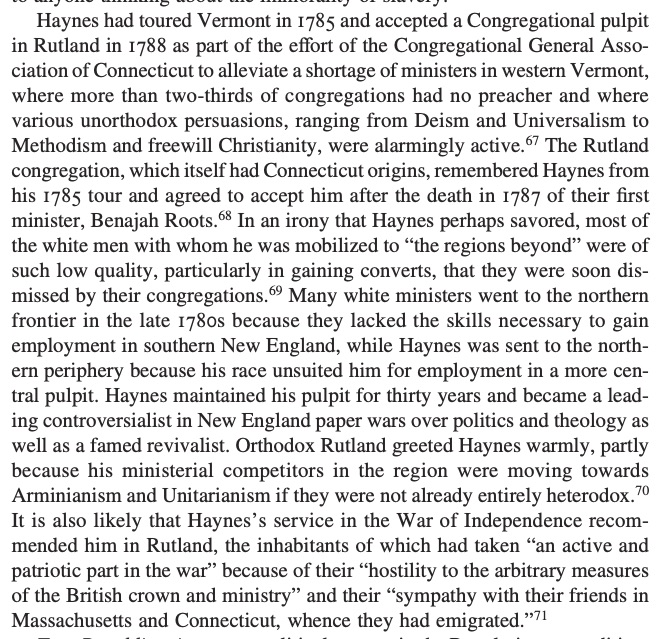JS summarizes LH's work as a Congregationalist minister.
- Type
- Book
- Source
- John Saillant Non-LDS
- Hearsay
- Secondary
- Reference
John Saillant, Black Puritan, Black Republican: The Life and Thought of Lemuel Haynes, 1753-1833, New York: Oxford University Press, 2003, 63
- Scribe/Publisher
- Oxford University Press
- People
- Benajah Roots, Lemuel Haynes, John Saillant
- Audience
- Reading Public
- Transcription
Haynes had toured Vermont in 1785 and accepted a Congregational pulpit in Rutland in 1788 as part of the effort of the Congregational General Association of Connecticut to alleviate a shortage of ministers in western Vermont, where more than two-thirds of the congregation had no preacher and where various unorthodox persuasions, ranging from Deism and Universalism to Methodism and freewill Christianity, were alarmingly active. The Rutland congregation, which itself had Connecticut origins, remembered Haynes from his 1785 tour and agreed to accept him after the death in 1787 of their first minister, Benajah Roots. In an irony that Haynes perhaps savored, most of the white men with whom he was mobilized to "the regions beyond" were of such low quality, particularly in gaining converts, that they were soon dismissed by their congregations. Many white ministers went to the northern frontier in the late 1780s because they lacked the skills necessary to gain employment in southern New England, while Haynes was sent to the northern periphery because his race unsuited him for employment in a more central pulpit. Haynes maintained his pulpit for thirty years and became a leading controversialist in New England paper wars over politics and theology as well as a famed revivalist. Orthodox Rutland greeted Haynes warmly, partly because his ministerial competitors in the region were moving towards Arminianism and Unitarianism if they were not already entirely heterodox. It is also likely that Haynes's service in the War of Independence recommended him in Rutland, the inhabitants of which had taken "an active and patriotic part in the war" because of their "hostility to the arbitrary measures of the British crown and ministry" and their "sympathy with their friends in Massachusetts and Connecticut, whence they had emigrated.
- Citations in Mormonr Qnas
The B. H. Roberts Foundation is not owned by, operated by, or affiliated with the Church of Jesus Christ of Latter-day Saints.

